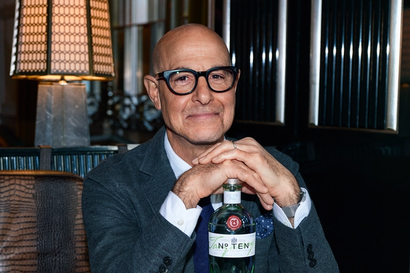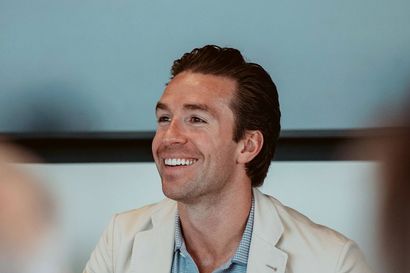Ralph Fiennes isn’t entirely convinced his new film is dark. In Italian director Luca Guadagnino’s upcoming A Bigger Splash he plays Harry Hawkes, an ageing music producer who floods the lives of his companions with emotional chaos. Fiennes’ performance as the irrepressible, compulsive Harry is mesmerising. Disturbingly good, in fact. There’s mischief, menace and portentousness in it, qualities that define the film’s searching narrative. Surely that makes it dark?
‘I don’t know, I’m too close to it…’ he says hesitantly. ‘It’s a provocative piece, yes. A multi-faceted piece. There is a riotousness to it, and it’s witty and it’s got a sort of vivacity in it. Luca is playful, and there is an undertone of threat. Something is building and we know something is going to go down. But the film has a lightness to it, even though what is going down is heavy. Is it dark? I suppose it is.’
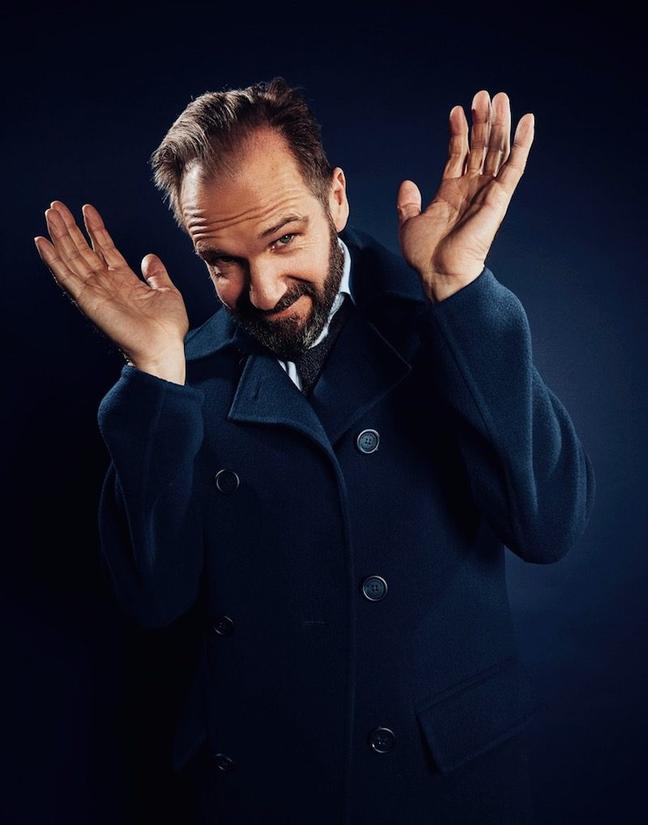
In the film, Fiennes’ character arrives unannounced on the bucolic Italian island of Pantelleria with his daughter (Dakota Johnson, who carries much of the film’s menace with delicious understatement) to interrupt a rock star (Tilda Swinton on top form) and her much younger filmmaker lover (Matthias Schoenaerts) who are vacationing there while she recovers from throat surgery. Harry and Swinton’s Marianne Lane were once lovers, and his presence and actions cause tension from the moment he comes careering into the departures lounge, a fitful, sexually charged cocktail of charm and danger.
Guadagnino has described the character of Harry Hawkes as one that ‘triggers destructive behaviour.’ What’s interesting is that when he was offered the part, Fiennes is reported to have said; ‘I’m in, because I feel I know this guy very well.’ Did he?
‘I recognised bits of myself, yes. Harry is a great part on the page and I didn’t think I’d played it before. This mischievous, highly energized, mostly extrovert provocateur. I could smell him – I knew what he was.’
There is a riotousness to Fiennes. A Loki-like mischief. Here on location in the glare of the flashbulbs, he takes his mark serenely, holding form with that brooding, impenetrable expression that makes him such a compelling screen presence.
So far, so Fiennes.
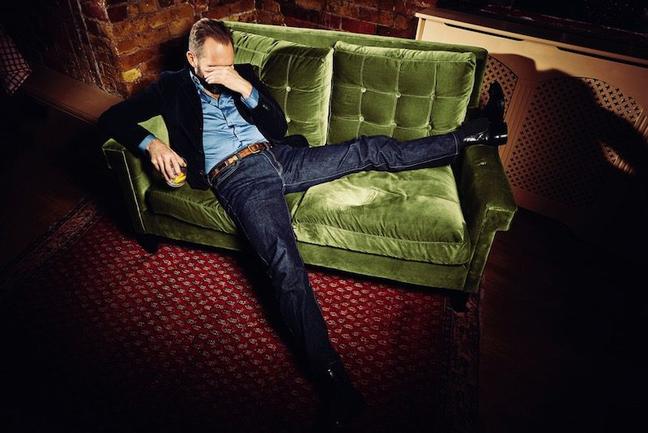
It’s not long though before he tires of the straight-laced stuff and gurns playfully into the lens. As the shoot continues, he will adopt a number of – let’s call them – provocative poses. Plenty of Harry in there, it would seem. ‘If you publish those, you’ll never work with us again,’ shouts his publicist above the studio laughter. And then seamlessly he switches back to the rather more earnest, RADA-graduate, English Patient face.
The effortlessness of these dramatic volte faces isn’t simply the sign of a man who can slip into character as the rest of us might a t-shirt, although clearly it is that. It’s also indicative of a man who doesn’t have a lot of trouble letting go of his inhibitions. Which is another way of describing the frequently naked, deliberately incendiary, apparently boundary-less Harry. Is seeing part of himself in the characters he plays essential to being able to bring them to life? Again, he’s not absolutely sure.
‘No, yes, I don’t know… You see bits of yourself. Perhaps you might see… I don’t know, it’s a good question.’ He rallies. ‘I think sometimes a part can be so far from you that you think you want to go there, because it’s like nothing you’ve ever had the chance to play or experience. Sometimes there are bits of it that are in you, and some that are not, and sometimes it can be very close to home.’
What resonates with Fiennes is how Gaudagnino has used A Bigger Splash as a vehicle for exploring what the director calls the ‘new conservatism ruling us today’. Harry is an anachronism by that measure, a figure representing a bygone rock-and-roll era that his ex-lover has moved on from. Only he can’t see it or accept it.
‘I know what Luca means,’ says Fiennes, his voice rising to the idea. ‘You talk to people who were in their 20s and 30s in the 1960s and ’70s and look at their approach to intimacy, sex, friendships, sexuality, the whole rock-and-roll life, and you can see that’s shifted.
‘The Labour party I remember when I was a student doesn’t seem very far from the Labour ethics that are being voiced by Jeremy Corbyn, yet you’d think by the way the press write about him that he’s this sort of weird, radical freak – and that tells me we’re living in very conservative times.’
Harry is the antithesis of this new conservatism. ‘Oh, he is! Way off!’ cries Fiennes, raising those articulate hands above his head, almost in triumph. ‘Politically, I think he’s a man who thinks it’s all b*******. He’s completely apolitical. Although he has a hammer and sickle tattooed on his tit.’
If Harry has lost control to his demons, those of Halvard Solness preoccupy him. At the end of January, Fiennes will return to the London stage to play Solness – the lead – in the Old Vic’s production of The Master Builder, a play written by Norwegian playwright Henrik Ibsen in 1892. The play has been adapted by David Hare. Fiennes calls it ‘a very complex psychological thriller’.
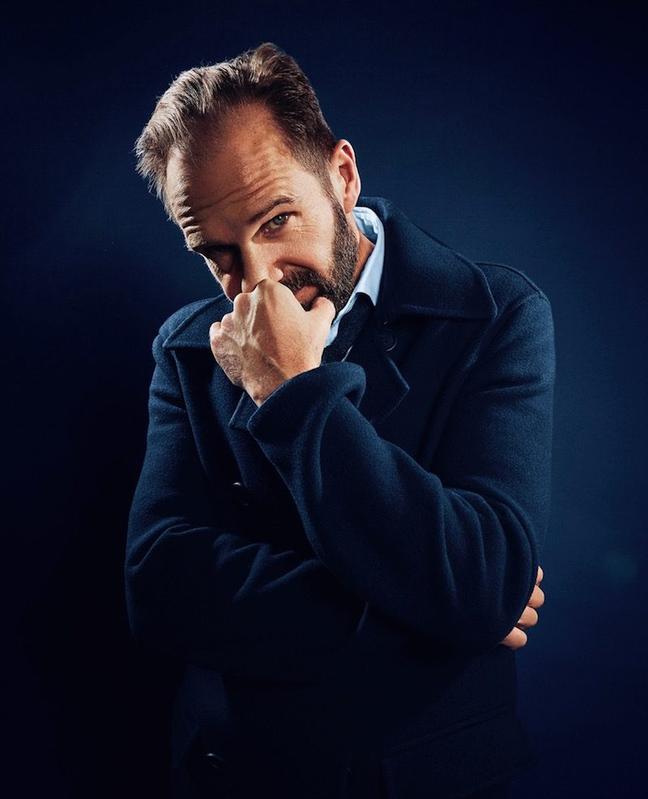
In the play, a builder-cum-architect at the top of his game is having a mid-life crisis. At some point, his relationship with his wife has been soured by an unexplained tragedy, and he is living, quotes Fiennes, ‘in fear of a state of youth’. The play deals with life and death, fear and control, themes the 53-year-old Fiennes is unafraid to admit he’s increasingly familiar with.
‘I feel I have more of a handle on those things,’ he says. ‘On mortality. When you’re in your 50s you see the descending slopes, and you try to make sense of what it is you think you’ve achieved or failed to achieve. You ask a lot of questions. When you’re young, you have a set of targets. And then you’re no longer young and you either want to reclaim the certainty of the targets you felt you had, or else they’ve all splintered, and you’re into questioning…’
He tails off, rather wistfully. Which for a man with his CV seems a little too self-deprecating. ‘Well, I’ve picked a few duds. I have,’ he says as if to convince himself. But he also has a serial ability to sniff out a hit. Having got his on-screen break playing Heathcliff in an adaptation of Emily Brontë’s Wuthering Heights in 1992, he was fast-tracked to stardom only a year later when he played the ruthless Nazi concentration camp commandant Amon Goeth in 1993’s Schindler’s List, a role for which he received one of his two Academy Award nominations – the other coming in 1996 for his turn as Count Laszlo de Almásy in The English Patient.
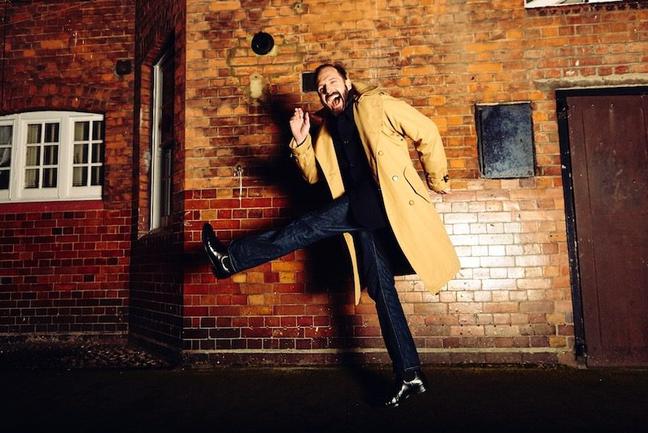
The luxury of his talent is that he has been able to choose the big-budget roles – Voldemort in the Harry Potter series, ‘M’ in James Bond’s last two outings – alongside the more original parts, rarely more memorably than in his hilarious portrayal of Monsieur Gustave in Wes Anderson’s uproarious Grand Budapest Hotel, for which he received Golden Globe and BAFTA nominations.
After A Bigger Splash, he’ll quickly return to our screens in the Coen brothers’ upcoming romp Hail, Caesar! in which he’s part of an extraordinary ensemble cast that includes George Clooney, Scarlett Johansson, Josh Brolin, Channing Tatum, Jonah Hill and – again, he’s a big fan – Tilda Swinton.
But he’s still one of that breed of actors that can’t stay away from the stage. ‘I’ve always tried to find a balance between film work and theatre work,’ he says. ‘I go to the theatre and when it works it has a magic for me that I very rarely get in a film. It’s the physical, present-tenseness of actors doing it now. They’re there. The air is alive at the moment of performance.’
There might be more to it than that. The Master Builder examines how we’re haunted by our pasts, by former versions of ourselves and the things we said and did. For movie stars, that fear must surely be heightened given their lives are catalogued in glorious-but-revealing Technicolor, whereas on stage they’re not?
‘There’s tension when someone walks on stage and says something,’ he says. ‘And then you’re transported. But it’s not recorded – and then it’s gone. There’s something in that that I find very compelling and I never want to lose touch with it.’

For us, there is double joy in seeing Fiennes on both stage and screen. One of the finest actors of his generation is at the peak of his powers in A Bigger Splash, consumed by his character and all his flaws, dragging us along with him – however reluctantly – towards the film’s unsettling denouement.
Not that he expects to win any awards for his portrayal of Harry Hawkes. ‘It’s interesting to see the crop of films that come in at this time of year,’ he says wryly. ‘I feel I’m looking for the most exciting, most original films, something that’s different. And yet you often see the stuff that’s pretty conservative winning, films trying to fit into a slot of so-called Oscar-worthiness. But it all feels a bit dead in the water. There’s always good stuff that’s ignored by awards.’
In the first act of A Bigger Splash, Harry recites some of the new Italian phrases he’s learned. ‘Vomitare l’anima,’ he rattles with furious energy. ‘It means to throw your guts up, or literally, to throw up your soul.’ Fiennes has made a career out of doing that for our entertainment. How spoiled we are.
A Bigger Splash opens in cinemas across the UK on 12 February. The Master Builder runs at The Old Vic from Monday 25 January to Saturday 19 March. For box office, visit oldvictheatre.com
Photography by Dylan Don // Styling by Holly Macnaghten // Words by Robin Swithinbank // Grooming by Carlos Ferraz

Become a Gentleman’s Journal Member?
Like the Gentleman’s Journal? Why not join the Clubhouse, a special kind of private club where members receive offers and experiences from hand-picked, premium brands. You will also receive invites to exclusive events, the quarterly print magazine delivered directly to your door and your own membership card.
